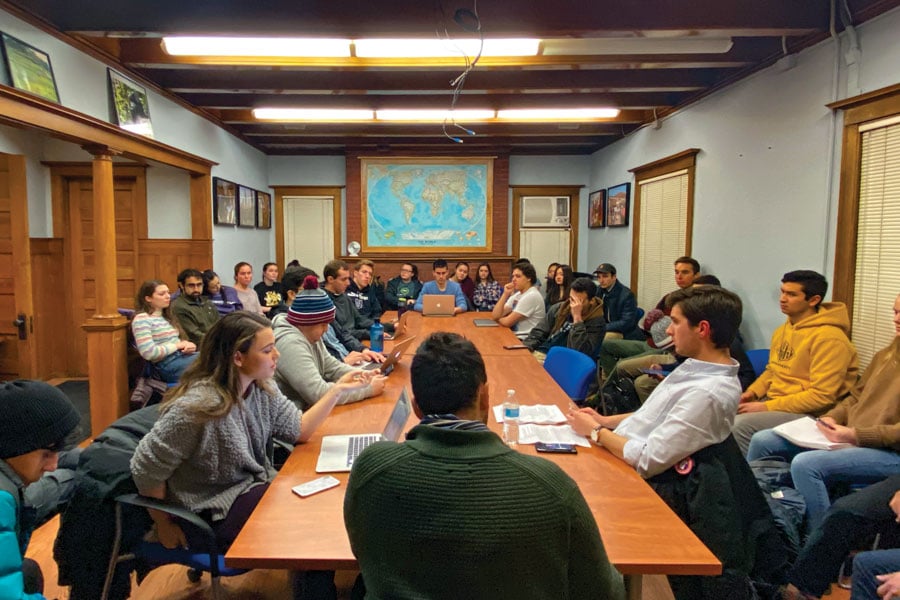Political Union debates assasination of Iranian general Qassim Suleimani
Spencer Allan/Daily Northwestern
Students at a Political Union meeting. The group narrowly voted in favor of condemning the United States’ assassination of Iranian general Qassim Suleimani.
January 14, 2020
In its first debate of Winter Quarter, Northwestern Political Union narrowly voted that the United States was wrong to assassinate Iranian general Qassim Suleimani.
The debate comes a week after President Donald Trump authorized a drone strike on Suleimani, who was a key figure in the Islamic Revolutionary Guards Corps’s clandestine operations. Previous American administrations have avoided targeting Suleimani out of fear of further destabilizing the region. Critics of the attack say it could lead to an all-out war between the United States and Iran.
Speaking against the assassination was Weinberg sophomore Anna Cork, who argued that the attack undermined the United States’ reputation in the region and further escalates tensions.
“There wasn’t really a legitimate reason behind it,” Cork said. “The claim that the killing was necessary to avert an imminent threat has only gotten more flimsy over time.”
Cork also discussed how the attack could strengthen nationalist sentiments in Iran while wearing down the United States’ relationship with Iraq. Last week, the Iraqi parliament voted to expel US troops from the country in response to the killing.
Communication freshman Zach Kessel spoke in favor of the assassination, saying that the move was essential to stopping violent attacks on America’s security interests. Kessel is an opinion columnist for The Daily.
“There has to be a display of force against Iran that will stop them from continuing the cycle of violence,” Kessel said. “They understand that when we won’t stop their belligerence, it’s OK for them to continue to do so.”
Kessel pointed to historical examples of deterrence such as the Cuban Missile Crisis and Operation Praying Mantis, in which US forces retaliated against the demolition of a ship by striking Iranian oil platforms.
“The crux of it is this deterrence works,” Kessel said. “If we had not taken out Suleimani they very likely would have continued that pattern of escalation.”
Many of the questions asked by students clarified the events of the last week, such as the accidental downing of Ukrainian International Airlines Flight 752 by Iranian forces. Others in the room questioned just how the effective the assassination was as a deterrent against violence.
“It’s dubious to assume Iran is a rational actor,” Bienen junior Sachin Shukla said. “We have not heard the last from Iran.”
Shukla referenced events from last September, when two major Saudi Oil Installations were hit by drones allegedly controlled by the Iranian government, as an example of potential retaliation.
Students also mentioned, albeit less frequently, President Trump’s motivations and reasons for the strike — points that critics of the assassination say are disingenuous.
“Republicans and Democrats who have been in these briefings have expressed they haven’t been able to adequately prove that they had intelligence that this was an actual danger,” Cork said.
Cork, as well as other attendees, questioned the legality of the killing on foreign soil.
At the end of the hour, Political Union voted 18 for and 15 against the motion to condemn the United State’s assassination of Suleimani, making Monday’s votes one of the closest of the academic year so far. Despite the vote, many students still felt conflicted about the United States’ future in the Middle East.
Email: [email protected]
Twitter: @spencerlallan
Related Stories:
In the wake of a House inquiry, Political Union debates impeachment
Northwestern Political Union votes to support decriminalization of illegal immigration during first debate


